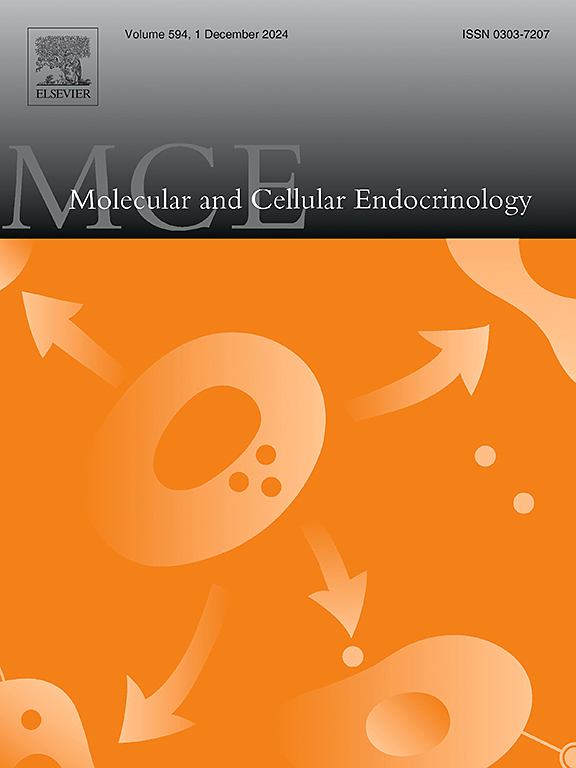EDNRB negatively regulates glycolysis to exhibit anti-tumor functions in prostate cancer by cGMP/PKG pathway
IF 3.8
3区 医学
Q2 CELL BIOLOGY
引用次数: 0
Abstract
Prostate cancer (PCa) is the most prevalent cancer in men and the leading cause of cancer-related mortality. Recent studies have highlighted the pivotal role of glycolysis in tumor progression. This study aimed to investigate the involvement of the EDNRB gene and its ligand endothelin 3 (EDN3) in glycolysis in PCa and to elucidate its underlying molecular mechanism. Quantitative reverse transcription PCR (RT-qPCR) and methylation-specific PCR (MSP) were used to probe EDNRB expression and methylation in PCa tissues. Cell proliferation and glycolysis in PCa cells were evaluated using Cell Counting Kit-8 (CCK-8), EDU staining, Seahorse assay, and biochemical kits to analyze the effects of EDN3/EDNRB. The underlying molecular mechanism was further explored through Western blotting. The in vivo effect of EDNRB on tumor growth was examined using a xenograft tumor model. Our findings revealed that EDNRB was hypermethylated and downregulated in PCa tissues and cell lines. Overexpression of EDNRB or EDN3 led to reduced cell proliferation and downregulation of glycolytic markers. EDNRB also decreased the extracellular acidification rate (ECAR) baseline and increased the oxygen consumption rate (OCR) baseline, indicating a shift away from glycolysis. Additionally, the anticancer effects of EDNRB or EDN3 was reversed upon inhibition of the cGMP/PKG pathway. In vivo, enhanced EDNRB expression significantly suppressed tumor growth. Therefore, EDNRB or EDN3 possess anticancer potential in PCa, primarily through the regulation of glycolysis via the cGMP/PKG pathway.
EDNRB通过cGMP/PKG通路负调控糖酵解在前列腺癌中发挥抗肿瘤作用。
前列腺癌(PCa)是男性中最常见的癌症,也是癌症相关死亡率的主要原因。最近的研究强调了糖酵解在肿瘤进展中的关键作用。本研究旨在探讨EDNRB基因及其配体内皮素3 (EDN3)在PCa糖酵解中的作用,并阐明其潜在的分子机制。采用定量反转录PCR (RT-qPCR)和甲基化特异性PCR (MSP)检测EDNRB在PCa组织中的表达和甲基化。采用细胞计数试剂盒-8 (CCK-8)、EDU染色、海马法和生化试剂盒分析EDN3/EDNRB对PCa细胞的增殖和糖酵解作用。通过Western blotting进一步探讨其潜在的分子机制。采用异种移植肿瘤模型检测EDNRB对肿瘤生长的体内影响。我们的研究结果显示,EDNRB在PCa组织和细胞系中高甲基化和下调。EDNRB或EDN3过表达导致细胞增殖减少和糖酵解标志物下调。EDNRB还降低了细胞外酸化率(ECAR)基线,增加了耗氧率(OCR)基线,表明糖酵解的转变。此外,EDNRB或EDN3的抗癌作用在抑制cGMP/PKG途径后被逆转。在体内,EDNRB表达增强可显著抑制肿瘤生长。因此,EDNRB或EDN3在PCa中具有抗癌潜力,主要通过cGMP/PKG途径调节糖酵解。
本文章由计算机程序翻译,如有差异,请以英文原文为准。
求助全文
约1分钟内获得全文
求助全文
来源期刊

Molecular and Cellular Endocrinology
医学-内分泌学与代谢
CiteScore
9.00
自引率
2.40%
发文量
174
审稿时长
42 days
期刊介绍:
Molecular and Cellular Endocrinology was established in 1974 to meet the demand for integrated publication on all aspects related to the genetic and biochemical effects, synthesis and secretions of extracellular signals (hormones, neurotransmitters, etc.) and to the understanding of cellular regulatory mechanisms involved in hormonal control.
 求助内容:
求助内容: 应助结果提醒方式:
应助结果提醒方式:


